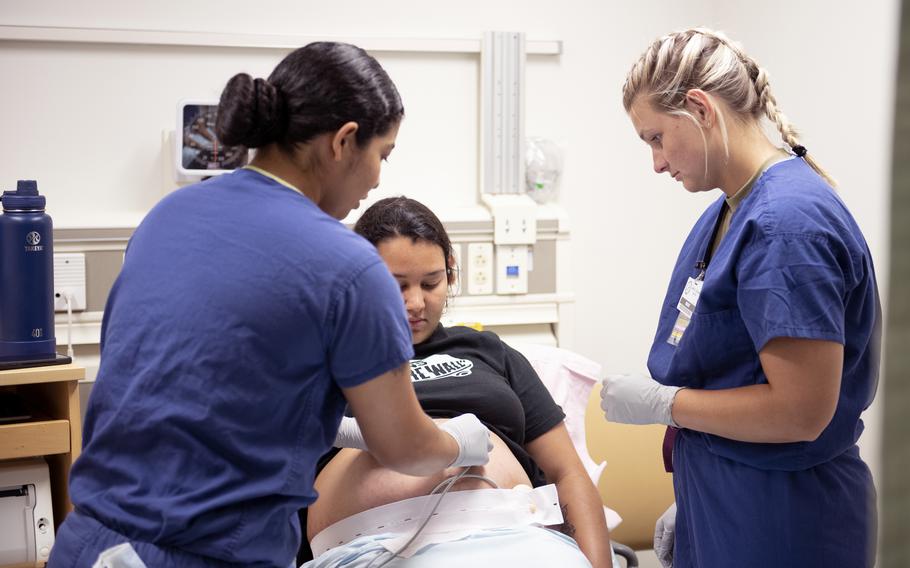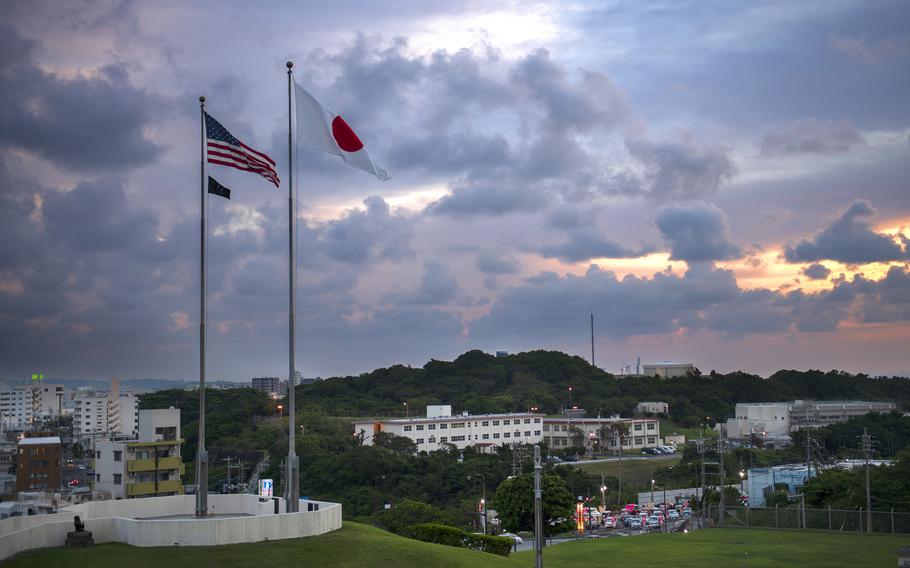
Air Force Staff Sgt. Sabra Szavuly, a medical technician, trains alongside Petty Officer 3rd Class Diamond Goldberg to monitor an expectant mother July 18, 2023, at U.S Naval Hospital Okinawa in Japan. A group of medical professionals is seeking to jumpstart hiring of qualified military spouses on Okinawa, a move they say will pay dividends for the chronically understaffed hospital. (Beth Holliker/U.S. Air National)
Medical professionals in Okinawa who have joined forces to shatter employment barriers for spouses of American service members see the effort as a way to relieve chronic staffing shortages at the Japanese island’s U.S. military hospital.
An online workshop Tuesday aims to identify impediments to putting more spouses to work at Naval Hospital Okinawa and its associated base clinics. At least 38 participants have agreed to attend the workshop, Hire Oki Spouse Project organizers said.
“There are so many issues that are happening with health care that if we could get some administrative rules changed, it would really ease the burden on the hospital,” said Julia Whitaker, an unemployed nurse practitioner who is married to an active-duty Marine. “But we’re not taking advantage of the things that are free to do that would help the system, and that is problematic.”
Located at Camp Foster, the hospital serves a military population of 47,000, including active-duty service members and their families, Defense Department civilian workers and their dependents, and retirees, according to the Navy.
A second meeting next month will identify solutions, and a resulting report will be shared with advocacy groups and perhaps with congressional leaders, organizers said earlier this month.
The group’s efforts highlight the systemic problems that keep many military spouses overseas unemployed. Many of those issues were highlighted in a Stars and Stripes report last month.
Barriers in Europe and elsewhere resulted in the reliance of a sizeable number of military families on a Defense Department program ensuring that pregnant women, infants and children have enough to eat.
The report also showed how military medical facilities benefit from rules that keep spouses from working overseas, encouraging them to volunteer as nurses or perform other unpaid health care duties.

The American and Japanese flags fly at Camp Foster on the Japanese island of Okinawa on July 20, 2023. A workshop to identify impediments to putting more qualified military spouses to work at U.S. Naval Hospital Okinawa and its associated base medical clinics is slated to have about 40 participants. (Beth Holliker/U.S. Air National Guard)
Organizers of Tuesday’s meeting in Okinawa point to inflexible hiring requirements and a lack of part-time or on-call positions.
Those hurdles sideline spouses, who need more flexible work schedules that account for the requirements of active-duty military families, they say.
Administrative rules and hiring practices that eliminate telework for Okinawa spouses who are medical professionals also are a problem, Whitaker said.
The meeting could lead to an increase in the number of qualified medical professionals available to the hospital and base clinics, thus addressing staffing problems, advocates say.
As an example of how problems at the hospital are affecting services, administrators notified pregnant military spouses in June that a critical personnel shortage meant that the women would have to leave the island several weeks before their due dates and deliver their babies in the U.S. or find a Japanese provider, Stars and Stripes reported June 9.
After media coverage, the Defense Health Agency reversed course and restored labor and delivery services at the hospital.
It blamed staffing shortages on the busy permanent change of station season and unexpected early departures of civilian staffers.
But a population of military spouse nurses already on base could have helped the hospital avert the problem and avoid the stress it caused, said Sydney Clark, a military spouse and registered nurse who couldn’t find a job in her field in Okinawa.
Solutions proposed by the group also could improve quality of life for service members and their families who rely on the hospital, said Clark, who is pregnant and earlier worried that she might have had to give birth to her first child somewhere else.
Workshop organizers say having a cross-section of participants should allow them to determine other pitfalls and pinpoint realistic solutions.
An online survey prior to the meeting will help guide discussions because the perspective of active-duty personnel also is needed, said Elayne Saejung, a military spouse who works in emergency health care management.
“It’s really going to depend on the solutions that are proposed and whether or not that’s in the hands of (local leadership) to solve some of those problems or if we’re going to need further assistance,” said Saejung, who recently left Okinawa and is now in Texas.